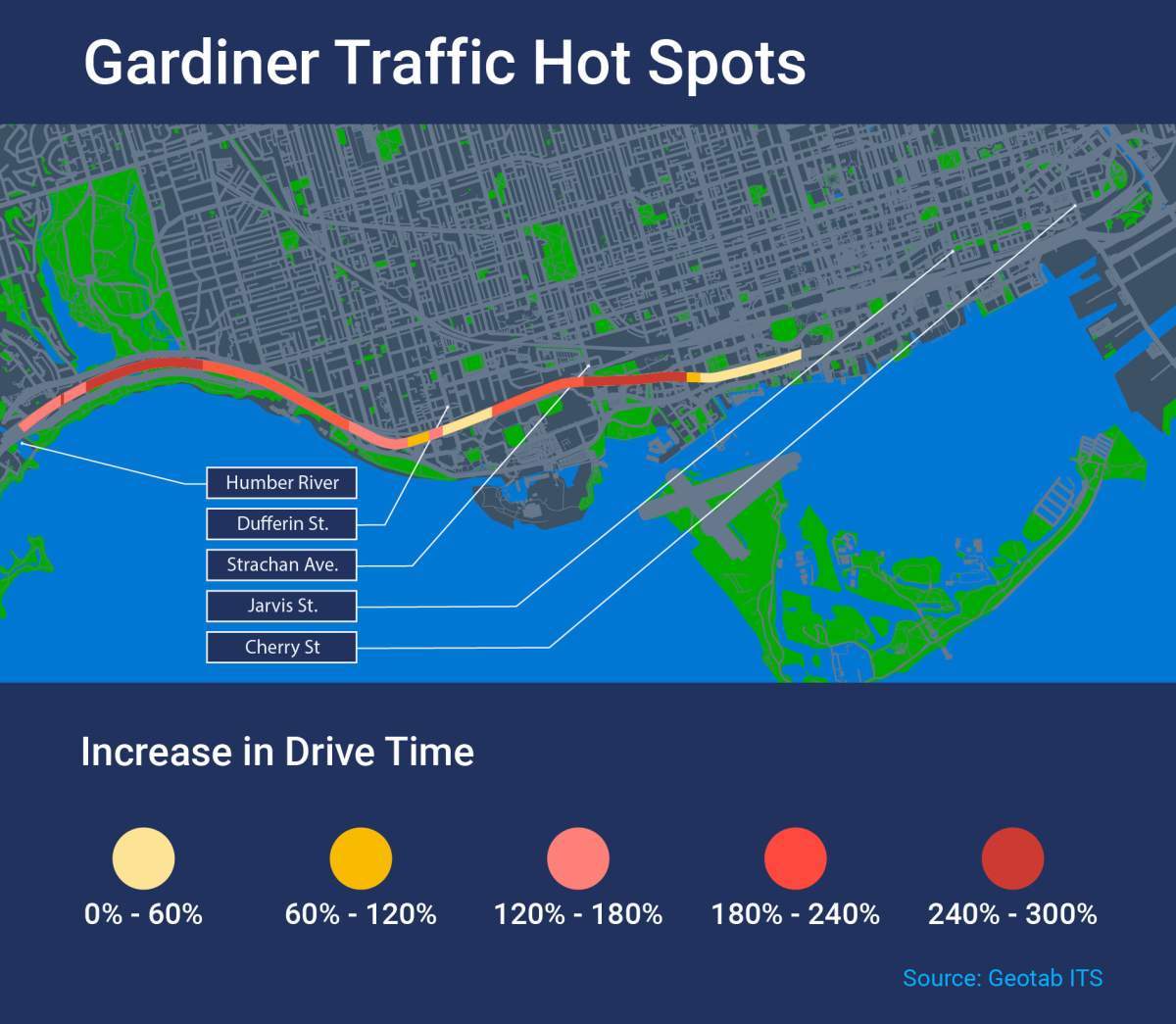There are two seasons in Canada, according to an old joke: winter and construction.

A new study this week looked at how summer slowdowns can affect productivity in Canada’s largest city. The numbers were huge — and a researcher says the issues apply to other major cities.
“The major construction going on on roads like the Gardiner Expressway obviously does disrupt commerce and it disrupts commuting,” University of Toronto professor Eric Miller said.
Toronto may be a “particularly severe case” because it hasn’t kept up with the infrastructure the growing city needs, but Miller said it’s a generic problem other major Canadian cities face.

“The cost of travel is about valued by people about $20 an hour. So every hour of extra delay is $20,” he told Global News.
The Gardiner Expressway, a major artery in downtown Toronto, is undergoing three years of construction. A report from transportation analytics firm Geotab ITS on Thursday suggested the lane restrictions from that work caused travel times to increase 250 per cent in the morning rush hour – meaning it takes up to two and a half times longer to get to work, “and 230 per cent in the afternoon rush hour.”
It comes after earlier this year, the Toronto Region Board of Trade warned the region is on the brink.

Get daily National news
“There’s a tipping point, and we’ve arrived at it, where people are so frustrated and it’s really starting to inhibit economic activity, business activity in the Toronto region,” Giles Gherson, president and CEO of the Toronto Region Board of Trade, told Global News in February after announcing a new traffic task force.
The Toronto Congestion Task Force, a City of Toronto group, pegged the annual productivity losses at more than $11 billion.
Before the pandemic, estimates in other cities pegged the projected costs of traffic congestion between $500 million and $1.2 billion a year for Metro Vancouver, according to the C.D. Howe Institute in 2015, to an overall U.S. trucking industry impact of $94.6 billion in 2023.
The Canadian Automobile Association pegged the cost of lost work hours from traffic congestion at $45 million for Montreal in 2021 and roughly double that for Toronto that year. Infrastructure fund CDPQ pegged the broader cost that year to Montreal, including costs like delivery delays, at roughly $4 billion.
- Best friends who played on Jasper hockey team remembered as ‘bright shining lights’
- Indian government no longer targeting Canadians, senior official says on eve of PM’s visit
- Cervical cancer is ‘fastest-rising’ form in Canada as doctors urge action
- Canada’s military recruitment surged amid sovereignty threats: data
Mike Branch, data and analytics vice-president for Geotab, said he “wasn’t totally surprised because I’ve been through that traffic.”
But seeing the impact measured, he said, was “pretty staggering.”
Branch said the company had GPS devices in around 10,000 commercial vehicles, from small cars to large trucks, that used speed, fuel consumption, “even windshield wiper activation in the vehicle” to gather the data.
The cost largely falls on the delayed commuting worker, not the employer, he added, saying it can also affect productivity because the driver may be more stressed once they finally arrive.
He clarified it’s hard to calculate an exact benefit-cost analysis of roadwork – other than knowing “it’s a big number.”
But, anecdotally, he said his son and daughter-in-law “live in the west end of town. We’re in the east end of town. They’re less likely to come visit us because it’s just too much of an effort to get across town right now.”
Overall, Miller said roadwork was a “necessary evil,” because without maintained streets, traffic and the economy would grind to a halt.









Comments
Want to discuss? Please read our Commenting Policy first.